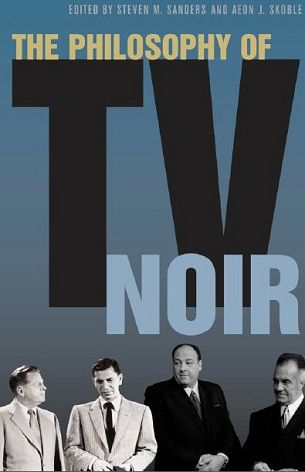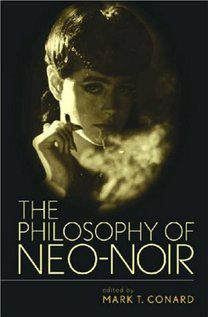The Philosophy of Film Noir Neo-Noir TV-Noir l 5.80 MB
Robert (FWD) Porfirio, Mark T. Conard - "The Philosophy of Film Noir"
University Press of Kentucky | ISBN 0813123771 | December 30, 2005 | 248 Pages | PDF | 2.1MB
When Nietzsche declared "God is dead," little did he know he was helping to launch a new cinematic genre characterized by shady characters and seamy plotlines involving fallen women, murder and betrayal. But noir is inevitably more than just stylish filmmaking or the marriage between American hard-boiled fiction and German expressionism, according to the philosophers, film historians and English professors who contributed to this book: film noir "challenged widespread assumptions about material and moral progress" and represents a "systematic deconstruction of the American Dream." Examining classic noir films and books by writers such as Albert Camus, Dashiell Hammett and James Cain, contributors discuss essence of film noir as reflecting a sense of disenchantment, "inversion of traditional values" and the "spiritual defeat of modernity." In her essay on The Maltese Falcon, Deborah Knight draws the distinction between the emotionally conflicted detective Sam Spade and his more detached predecessor, Sherlock Holmes. Philosophy professor Steven Sanders sifts through existentialist texts and classic noir films to find the meaning of life, while several contributors weigh in on themes of morality and Pulp Fiction gets a deep scholarly massage from Conard. Dense and intriguing, the book suggests noir is best perceived as a slightly warped mirror held up to contemporary society.
Mark T. Conard - "The Philosophy of Neo-Noir"
University Press of Kentucky | ISBN: 0813124220 | 05/01/2007 | English | 222 pages | PDF | 1.5 MB
Film noir--a cycle of American films from the 1940s and '50s--is characterized not only by a constant opposition of light and shadow and a disruptive compositional balance of frames and scenes, but also by dark, foreboding characters and plots and an overriding sense of alienation and moral ambiguity. Noir films reflect the sense of loss, fragmentation, and nihilism at the heart of the human condition in the twentieth century.
Although the classic film noir period ended in the late 1950s, its impact on more films has been profound. While typically not black and white, these new films incorporate the noir sensibility of alienation, pessimism, moral ambivalence, and disorientation. This sensibility is obvious in films such as Blade Runner, Reservoir Dogs, Chinatown, and Memento. Until now, little scholarly attention has been paid to the unique philosophical conventions of the widely popular neo-noir genre.
In The Philosophy of Neo-Noir, editor Mark T. Conard and other contributors explore the philosophical foundations of neo-noir, using the films to discuss and explain traditional philosophical ideas as well. The themes and topics covered include justice and moral corruption; problems of memory and identity; human nature, space, time, and subjectivity; crime and punishment; pain and redemption; and spiritual transcendence. Conard argues that neo-noir films have benefited as censorship has relaxed, giving current filmmakers a rich noir tradition from which to draw.
Steven M. Sanders - "The Philosophy of TV Noir"
University Press of Kentucky | 2008 | ISBN: 0813124492 | Pages: 272 | PDF | 1.42 MB
The influence of classic film noir on the style and substance of television in the 1950s and 1960s has persisted to the present day. Its pervasiveness suggests the vitality of the noir depiction of human experience and the importance of TV for transmitting the legacy of film noir and producing new forms of noir. Noir television is also noteworthy for its capacity to raise philosophical questions about the nature of the human condition. Drawing from the fields of philosophy, media studies, and literature, the contributors to The Philosophy of TV Noir illuminate the best of noir television, including such shows as Dragnet, The Fugitive, Miami Vice, The X-Files, CSI and 24.
Link :
Code:http://ul.to/2ru0iuc5
Please visit our sponsors
Results 1 to 1 of 1
-
19-09-2016, 08:07 PM #1Senior Investor

- Join Date
- Jan 2012
- Posts
- 7,166
- Feedback Score
- 0
- Thanks
- 0
- Thanked 6 Times in 6 Posts
 The Philosophy of Film Noir Neo-Noir TV-Noir
The Philosophy of Film Noir Neo-Noir TV-Noir
-
Sponsored Links
-
Sponsored Links
Thread Information
Users Browsing this Thread
There are currently 1 users browsing this thread. (0 members and 1 guests)
24 Hour Gold
Advertising
- Over 20.000 UNIQUE Daily!
- Get Maximum Exposure For Your Site!
- Get QUALITY Converting Traffic!
- Advertise Here Today!
Out Of Billions Of Website's Online.
Members Are Online From.
- Get Maximum Exposure For Your Site!
- Get QUALITY Converting Traffic!
- Advertise Here Today!
Out Of Billions Of Website's Online.
Members Are Online From.






 LinkBack URL
LinkBack URL About LinkBacks
About LinkBacks








